English RISE Projects
Creating Futures Together

English RISE Projects
Creating Futures Together
The Year 7 RISE English students have been working on a unit that is inspired by the Reconciliation Week and the school’s Aboriginal Cross Curriculum program. One thing the students have learned is that the land is very important to the First Nation people. To help them develop their connection to land, they were instructed to complete a mysterious ‘explorer’ mission. In this task, each student was asked to choose one location at school, take a photo of that location and write ten things about it that they hadn’t noticed when they arrived. Here is some work from the students:
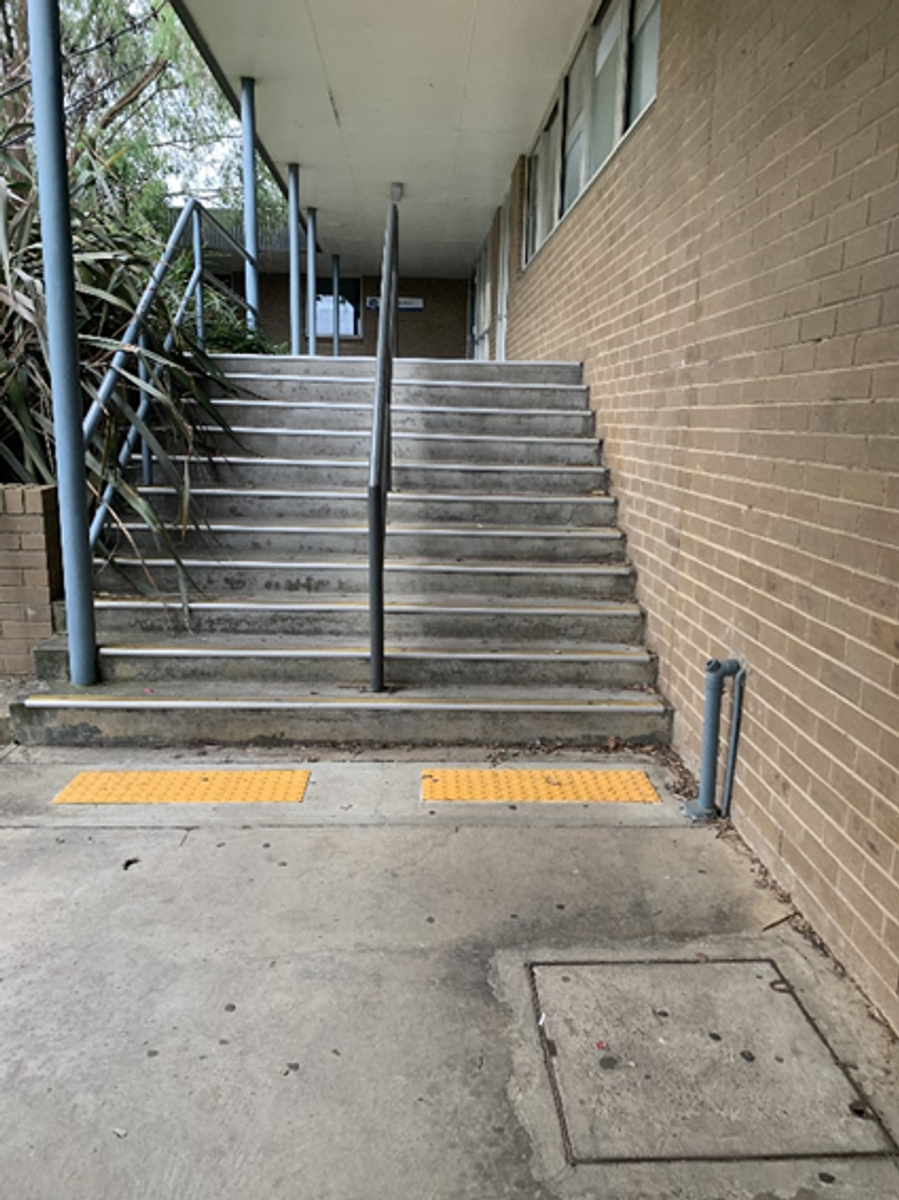



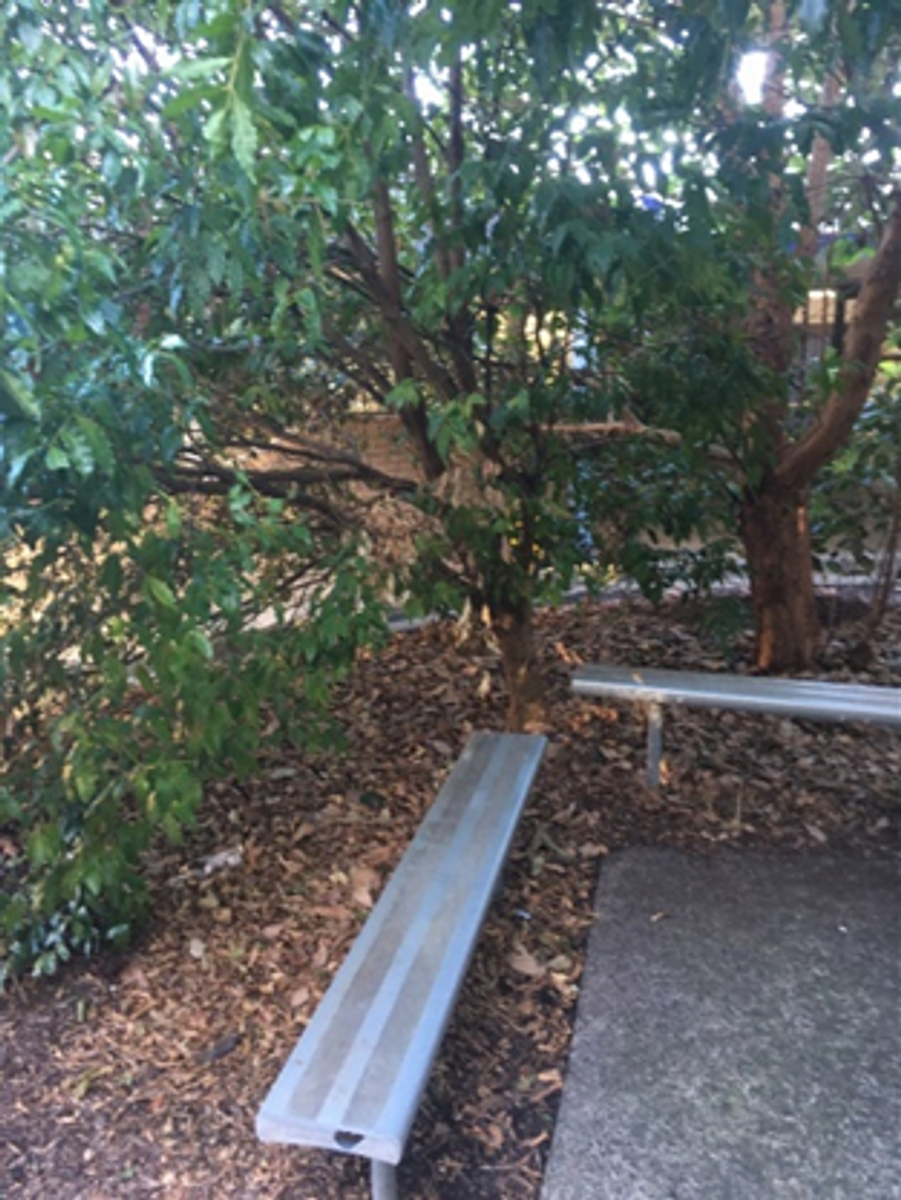
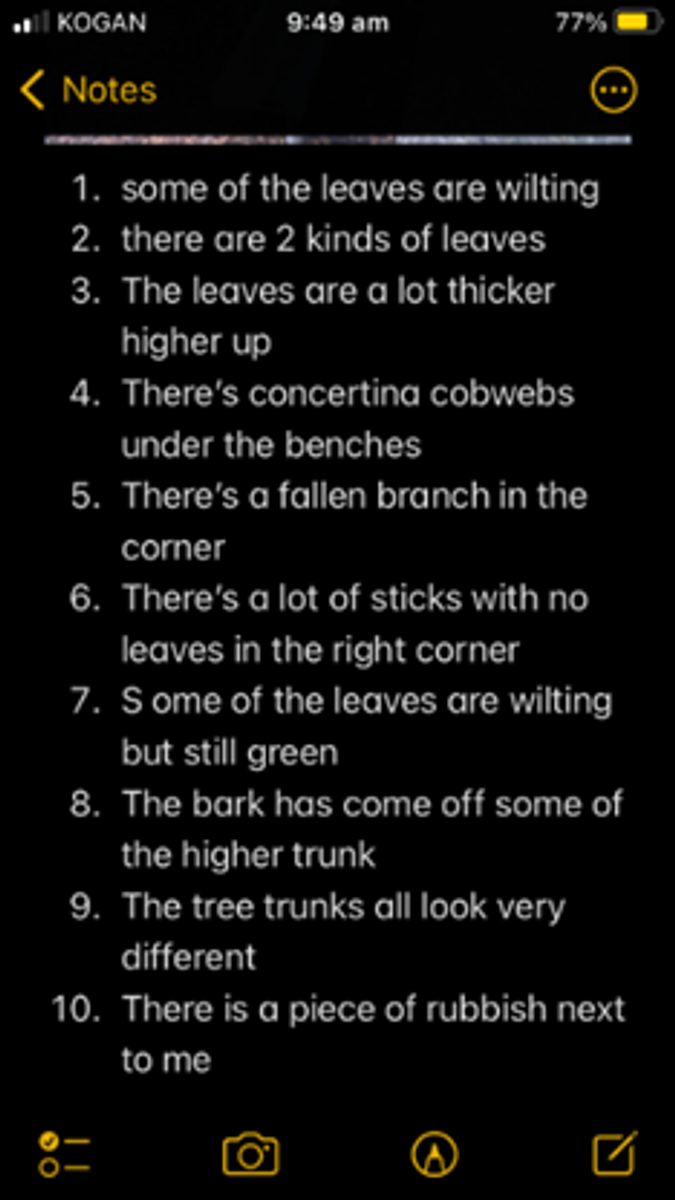


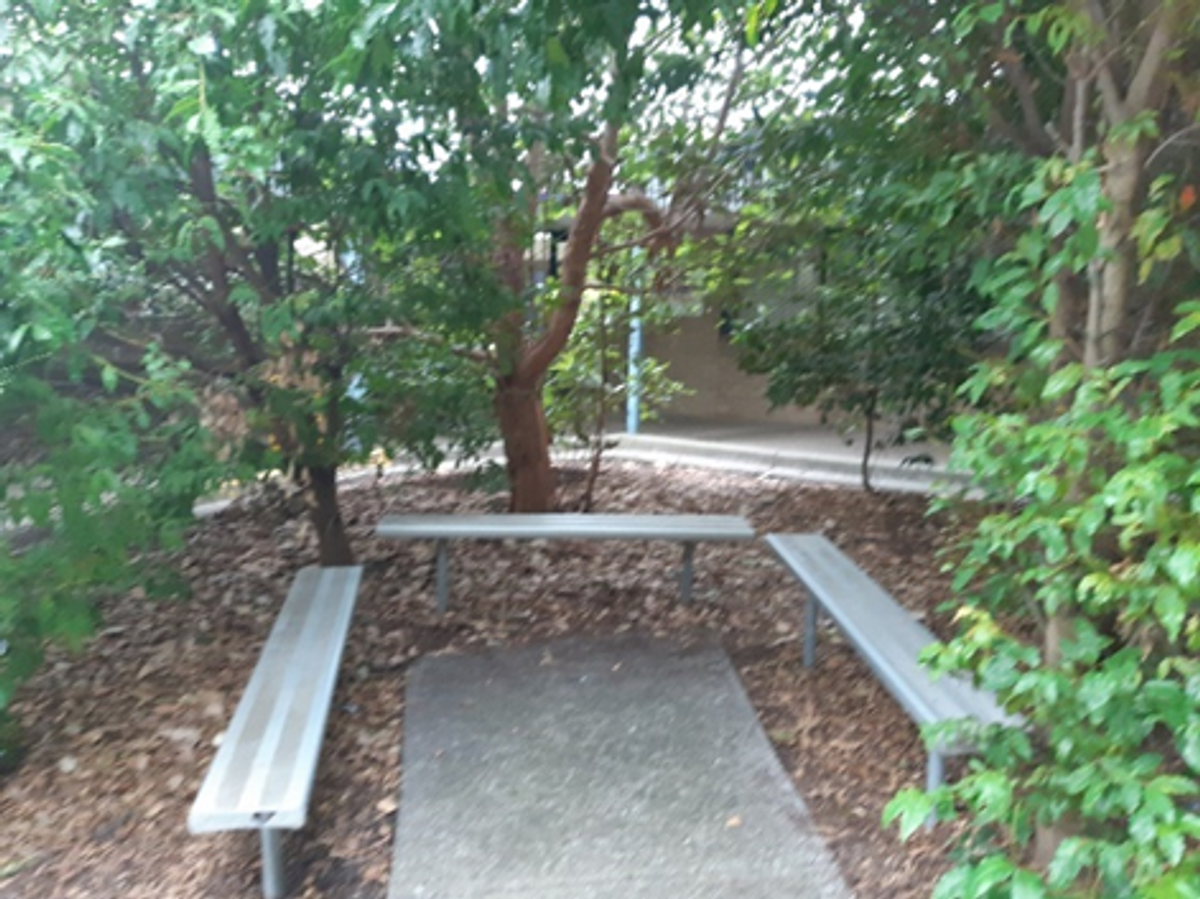

10 things I notice about this place:
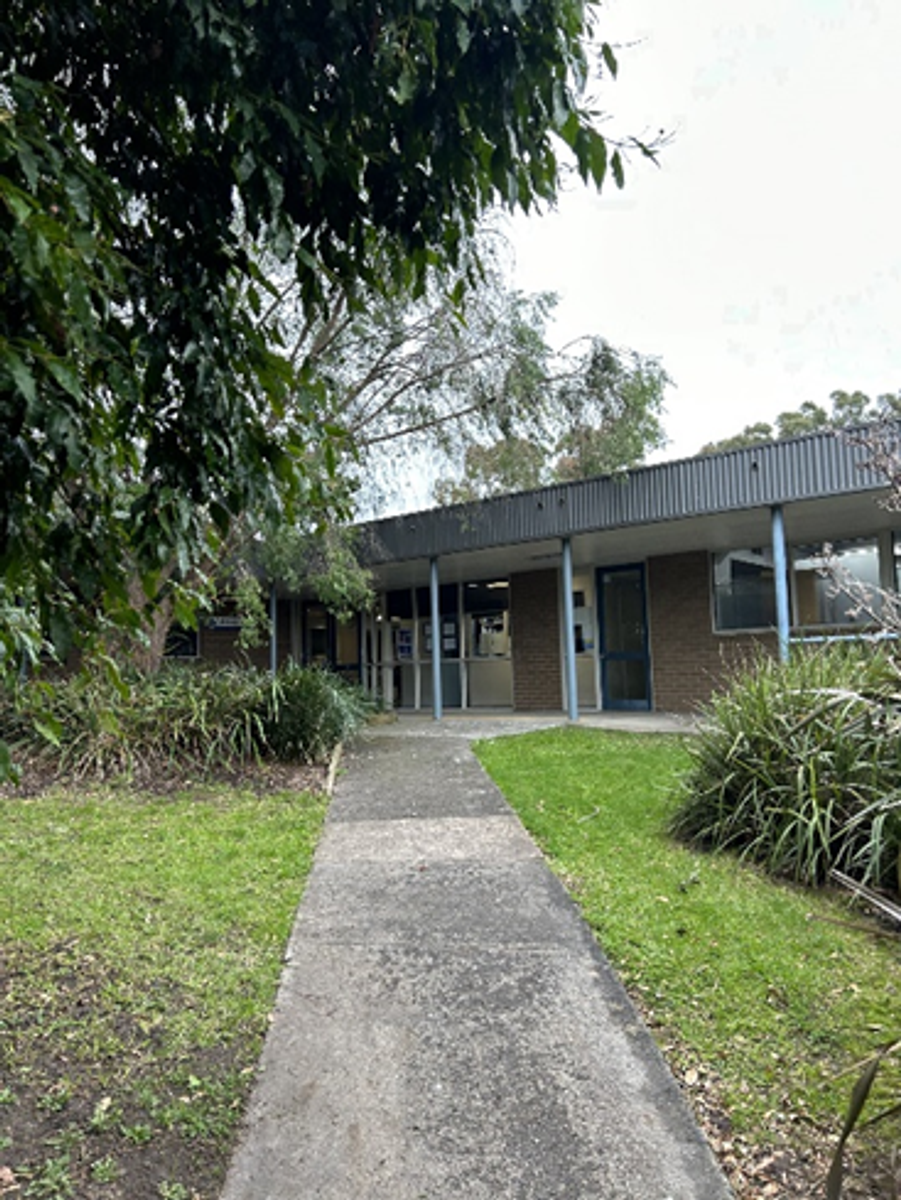
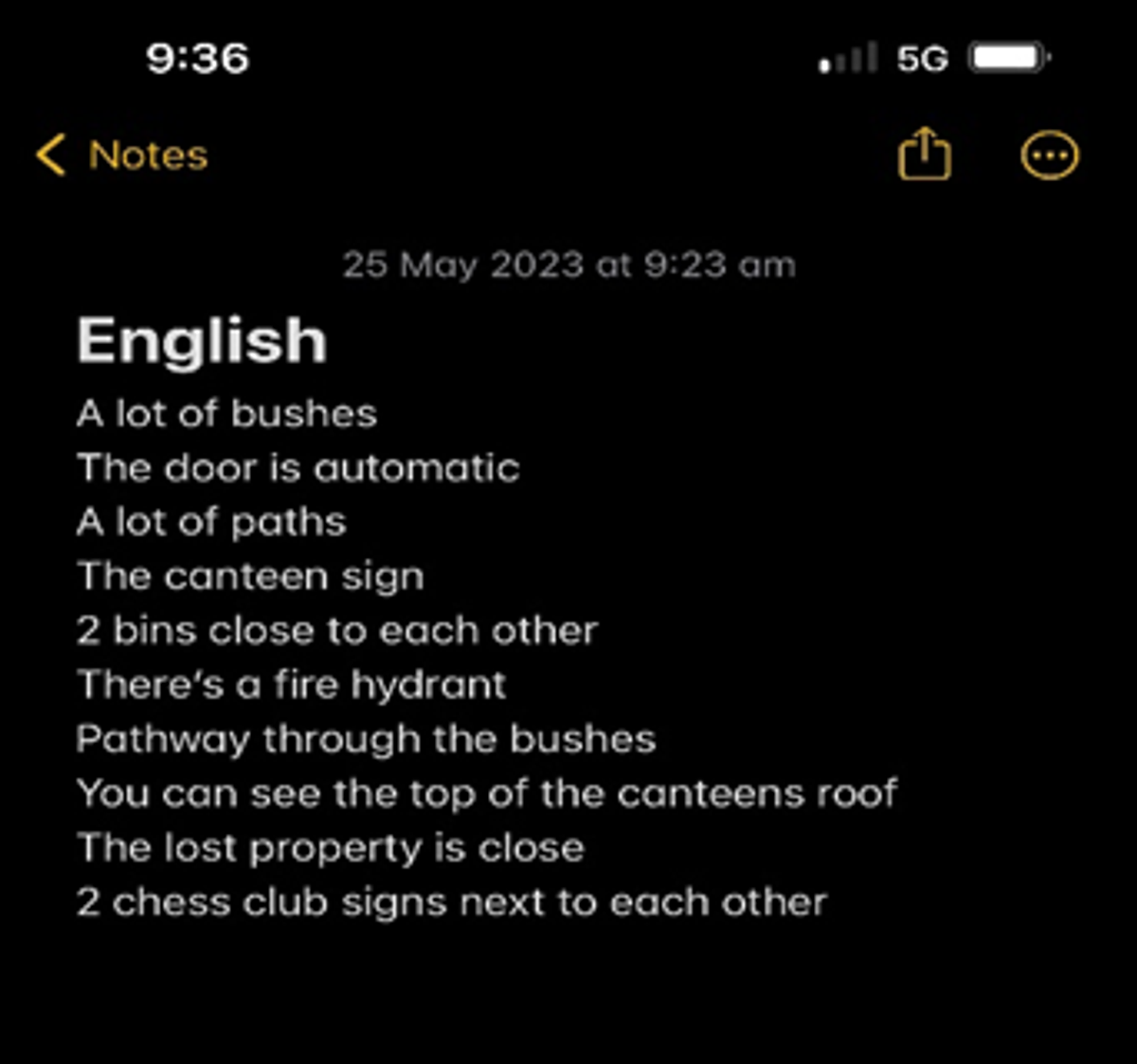



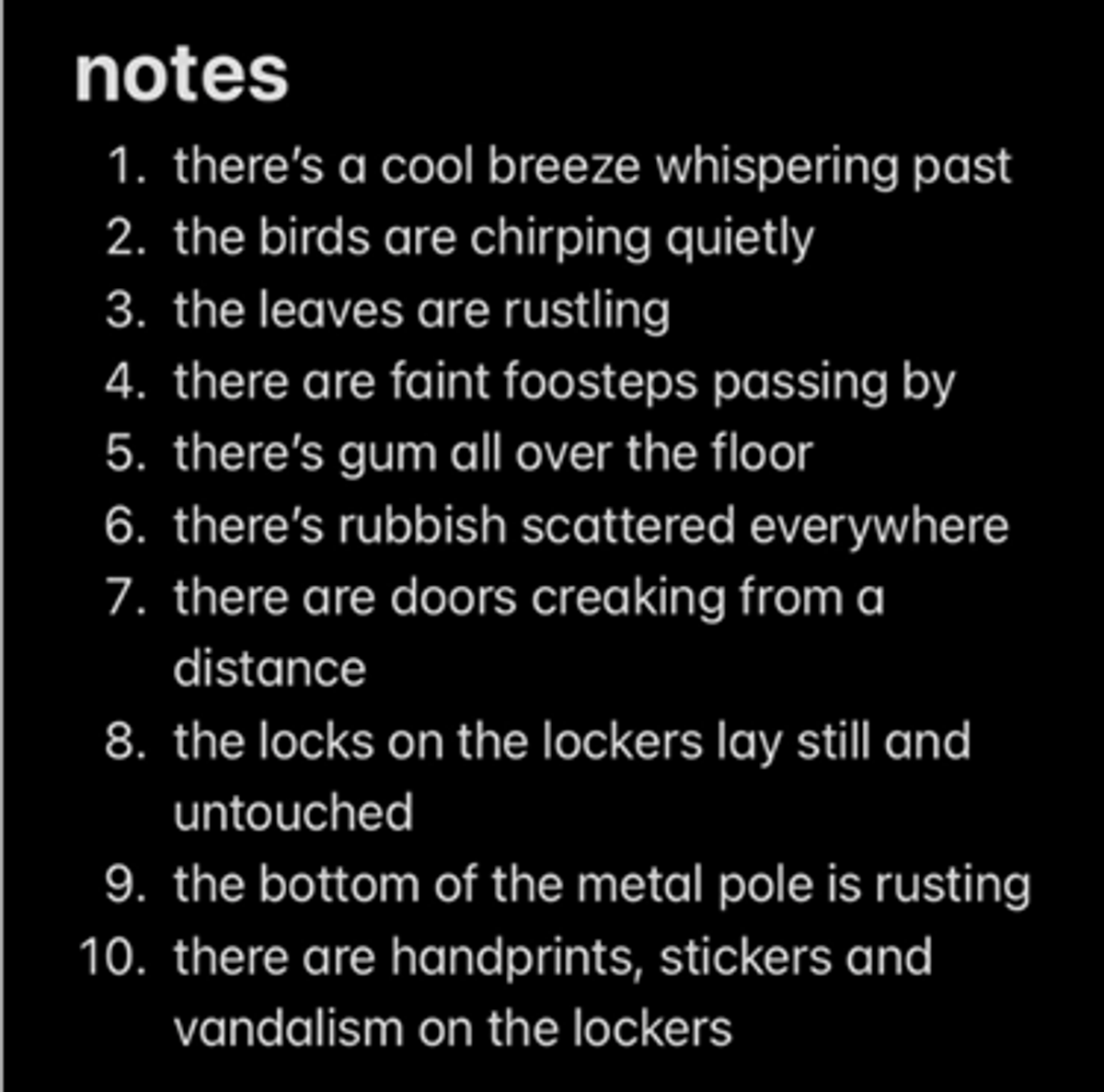



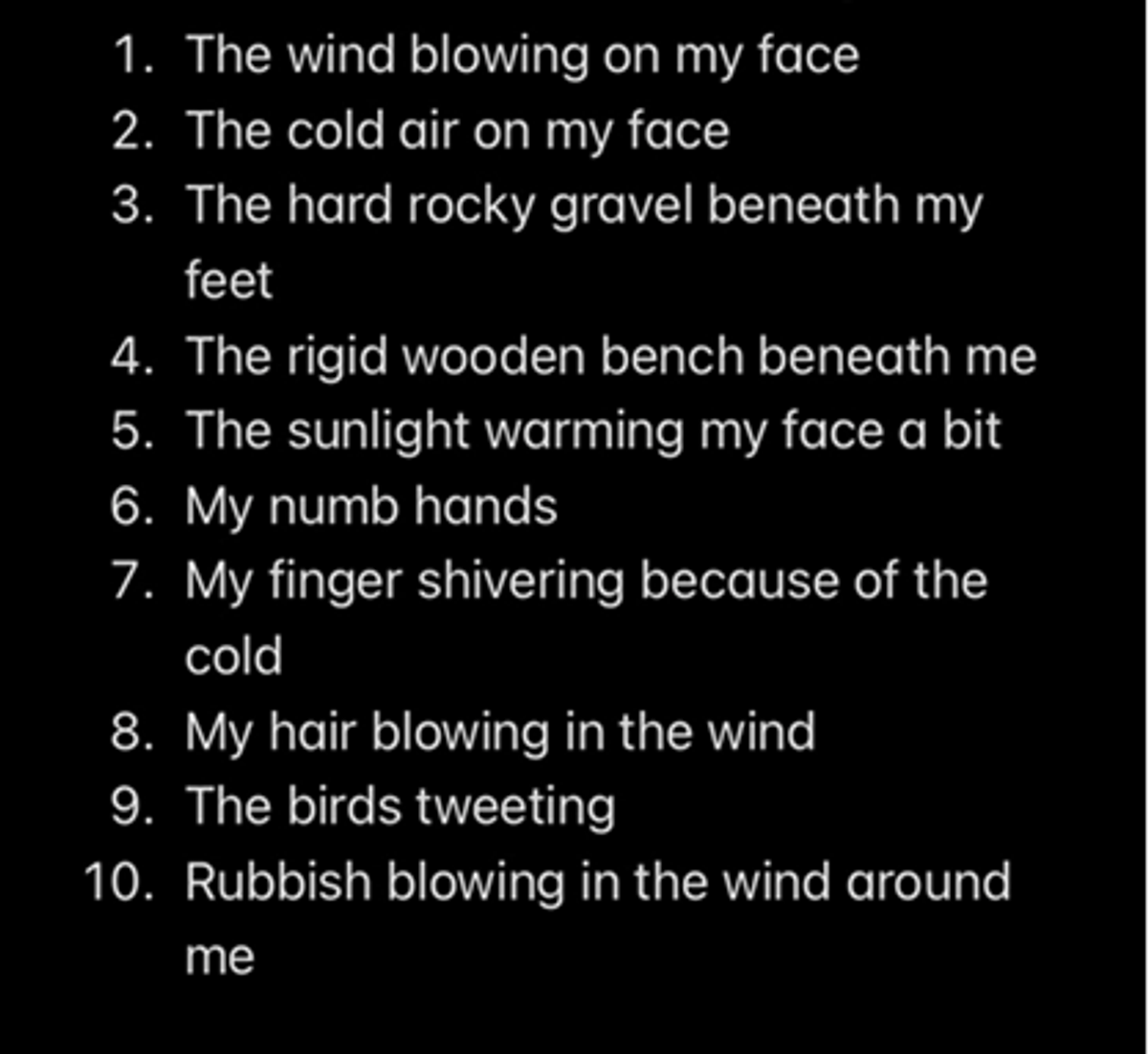


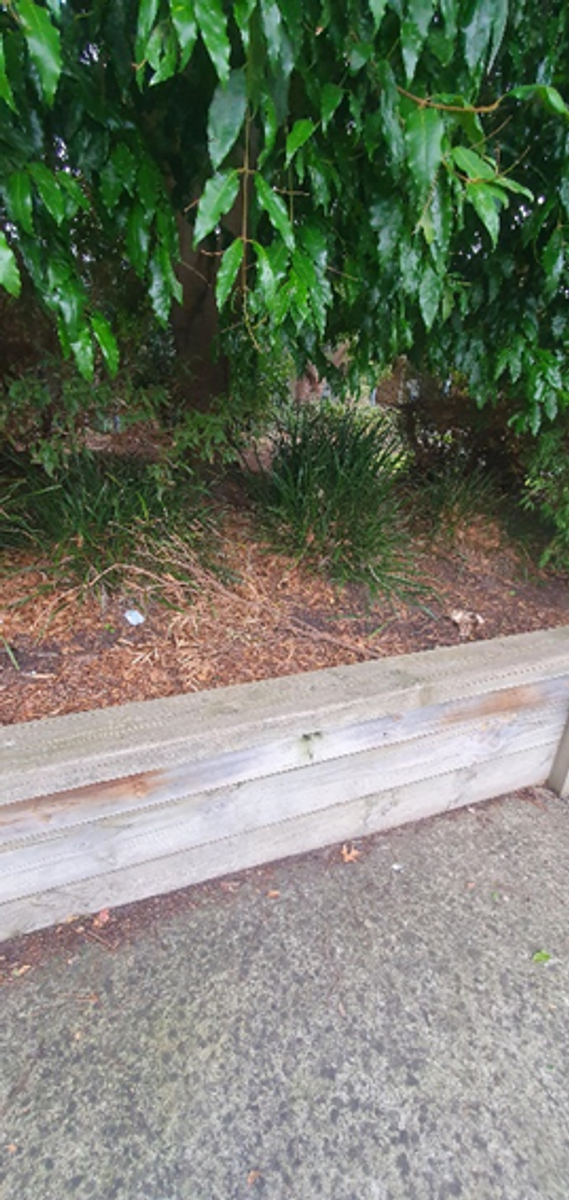
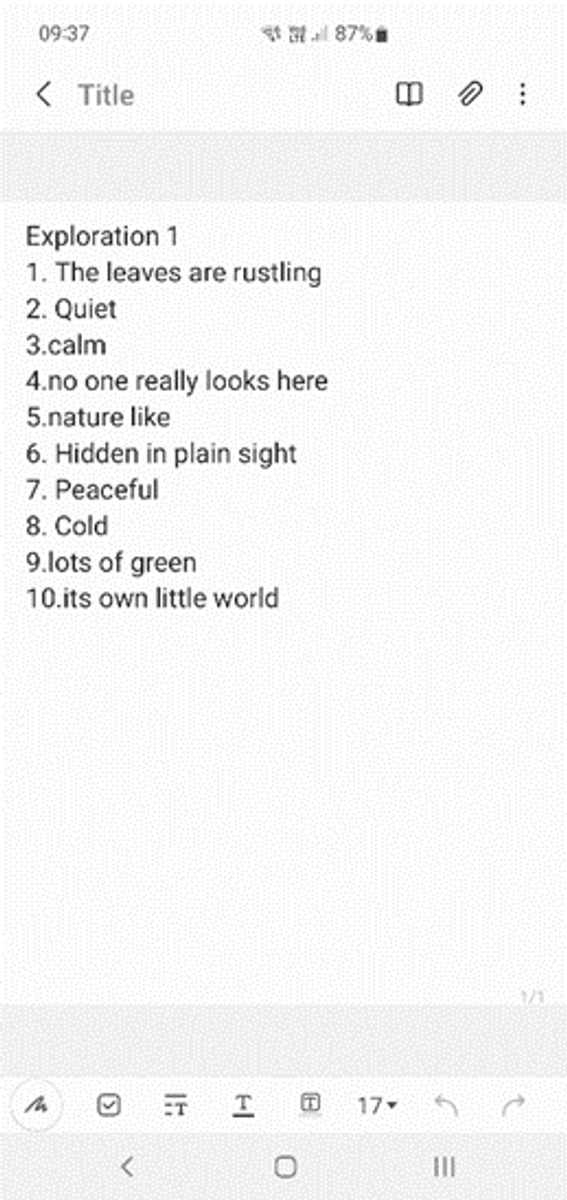




I am at the Oval and what I haven’t noticed before is that there are a lot of trees on the outside of the Oval and there are some trees even outside of the school. Also, there’s a school board over at the side of the oval and also there is not many birds. The trees are very spread apart from each other and there’s a lot of space and there’s no gates to get out. Also, the trees they’re really tall and they look the same the goalposts look small from a distance but like on an angle. I haven’t realised the patterns that were inside of the house gates and that the Oval is really big. The AFL posts aren’t that tall the oval weird because it just is. The grass has been cut I think on half of the Oval but on the other half the grass hasn’t been cut and it’s not really fresh. The trees are covering some spots so if you go there, you can literally hide in it, and no one will see you. There are lots of trees on one side of the Oval and they look very close together there are not many bugs or bees here. The teachers cars are parked also there are a few benches on the oval.
To develop their understanding of the purpose of the Reconciliation Week, students also did a piece of Reconciliation Week reflective writing. In this piece, they were instructed to include their personal experience of a conflict and a specific conflict that happened between Aboriginal and Non-Aboriginal people. Here is some work from the students:
Reconciliation Between Indigenous and Non-Indigenous Australians
By Olivia H
The purpose of reconciliation week is to restore and strengthen relationships with Indigenous and Non-Indigenous Australians. Reconciliation week starts on the 27th of May and finishes on the 3rd of June every year. A situation that is still being reconciliated to this day is the relationship between The First Nation’s Peoples and the white Australians regarding the Stolen Generations.
The Stolen Generations was a period of time in which the white Australians declared that The First Nation’s people’s lives would be better if they became part of white society. Many generations of the aboriginal children were taken away from their families by governments and were forced to assimilate into and work for white families. As a sequel, the children loss connection to their biological families, identity, culture and tradition while experiencing an extreme amount of agony and misery. Many of the children had to endure intense abuse and neglect in different ways as they had to work for white families.
This unforgettable period of time finally ended in the 1970s.
38 years later, in the February of 2008, Prime minister Kevin Rudd officially made apology on behalf of the nation to the Indigenous peoples of Australia, specifically to the families who were affected by the Stolen Generations era.
Now I’ll share the story of how my brother and I reconciliated after an argument.
A few months back, my older brother and I had an argument regarding a rude word he had called me. We had a disagreement which then escalated into a big fight.
I felt extremely angry at him, as he didn’t understand what I was saying at all. But I thought it over and realised that part of the disagreement was my fault. I didn’t realise this at first, but I did after reflecting and thinking about my actions and what had happened.
This resulted in us not talking and we avoided each other for a while, but a few weeks later we started talking to each other again. Although we still talked, we didn’t resolve the conflict between us, but soon we ended up discussing the matter and apologising to each other for what we had done.
This moment impacted me a lot, as I realised how important my brother was to me and how my actions can impact others- not only him, but other people in my life too.
A lesson I’ve learnt is that you should always think about your choices and how they’ll impact you in the future.
Although I still don’t forgive him for what he did, I have moved on from the past and I’m now focusing on the present.


My advice for the Indigenous and Non-Indigenous people to reconciliate is that the two parties can give it some time and move on from the situation, leaving it in the past. When both parties are ready to discuss the matter, they can apologise to each other. They do not have to forgive each other; however, they must move on and focus on the present and the future.
Storytime With Playschool
By Will J
I fight with my sister A LOT…
I have a LARGE amount of conflicts to talk about, but I guess I’ll talk about this one.
Exhausted, after a tiring 6 hours of school, I’d say I was angry when my sister came up to me and yelled “MUM SAYS IT’S MY TURN ON THE TV!”
My flawless response was “no.”
She then proceeded to have an outburst of rage. “BUT MUM SAID IT WAS MY TURN!!”
Slightly frustrated, I stomped straight to my sister, and decided to say “I don’t care, I’m tired, leave me alone”
When I thought she’d understand and leave me be… “I’M TELLING MUM!”
I fought back with “WHATEVER, YOU’RE A JERK!”
Mum was closing in on my location, and tensions were rising… so I admitted, (sigh) defeat.
With my bravery I handed over the remote and let her play. ☹
I find this BRUTAL scenario very similar to that of the aboriginals and the white Australians.
It may seem ridiculous to compare fighting over a controller to fighting over land, but it might not be.
There’s always been one scenario that’s similarly brutal to mine, and that is the Arrival of the First Fleet, at Botany Bay…
After sailing for months with no end, the Europeans, had finally found land, at Botany Bay. They’re goal was to claim land, which at the time was named “no man’s land”, and to them, was unclaimed.
However, this land was not “no man’s land” as the aboriginal Australians had already claimed it long ago.
So, as the boats arrived, and anchored to the shore, the Aboriginals were in awe of what they’d seen.
The aboriginals then prepared they’re weapons, nervous of the threat displayed smack in front of their faces.
Then… spears, arrows, and bullets were thrown between one another.
This was the start of a war between the white Australians and aboriginals.
This war caused the deaths of many aboriginals and Australians. Not only deaths, as this would cause the Aboriginals to lose such a large amount of they’re land.
Many years later however, this conflict that had waged on had finally become extinct. Aboriginals where given 50% of the land stolen back, as an apology from white Australians.
Essie Coffey
By Elias P
Essie Coffey was born in 1940 and she was a member of the Muruwari people of north-Western NSW and southern Queensland. She was a community worker, singer, actress and filmmaker. She and her husband, Albert ‘Doc’Coffey, raised 18 children, of which 10 were adopted.
In the 1860’s White Australian’s took Aboriginal children away from their families. These children are called the Stolen Generation White Australians believed that taking away the children of Aboriginal people would benefit them by giving them what they considered a proper culture and education. Aboriginal Australians were affected by this conflict because it gave the Stolen Generation trauma because they got stolen from their parents.
Essie Coffey avoided being relocated to a reserve because her father kept moving the family around for his work. When Essie was older she fought for Aboriginal rights and she co-founded the Western Australian Legal Service to help her fellow Aboriginal people. She was also an inaugural member of the National Council for Aboriginal Reconciliation.
Reconciliation week is a time where Australians learn about their shared culture and histories with Aboriginal Australians. White Australians have begun to reconcile with First Nation people by acknowledging that Aboriginal people were living on Australian land before us and we took over their land. We are also welcoming Aboriginal people into our community.
Essie Coffey was offered an MBE* but refused this title on the grounds of believing that she was an Australian not a member of the British Empire. She chose to follow her own path rather than follow the path that the British people created for Aboriginals. This correlates to my own experience. When I was younger I tried to climb a tree in my backyard that had the best view. As I was climbing, the branches kept snapping and I fell. The branches of the tree were all broken so I could not climb it anymore. But then I realised that there were four other trees that I could climb for practically the same view. I chose one of these trees to climb and the branches did not break. Essie also tried to climb her tree by trying to gain the same rights as white Australians but failed. Eventually she gave up on trying to climb that tree and realised that she was in a forest of trees so she chose anther one and started climbing however this time the branches were not breaking so she climbed to the top and helped convince others that Aboriginals should have rights.
In my personal opinion of conflicts and reconciliation we should acknowledge that they were there before us but I have no idea how we are to resolve ages of damage to the relationship
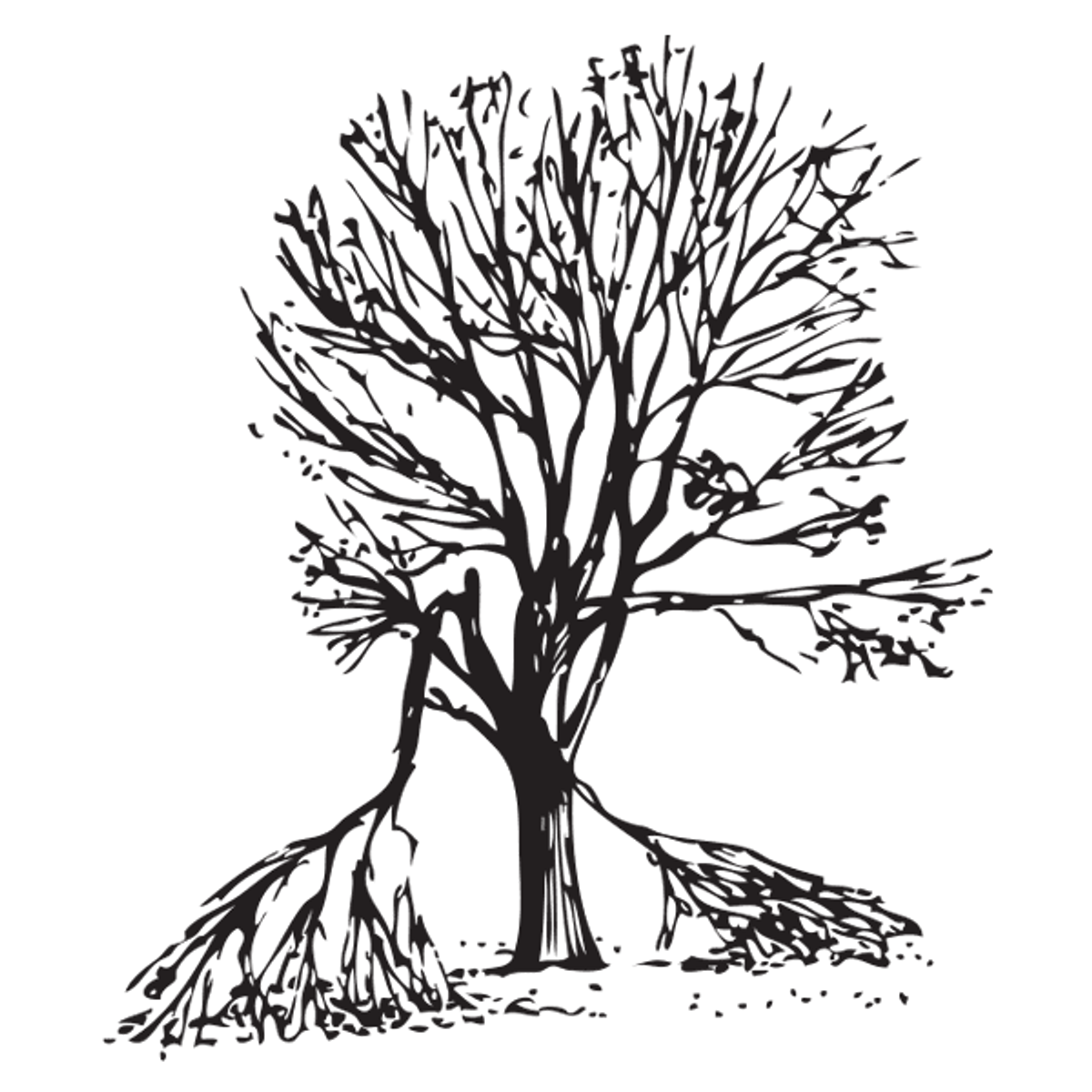

* MBE: it is the third highest order of the British empire award excluding a knighthood/damehood.
By Evangelina D
The date was 18th of January, 1788. 11 boats lined the shore of botany bay. 8 months of sailing finally payed off. Along the boats, lines of convicts, women and children. Captain Author Philips stepped off the boat, confidence and pride filled his face. Then out of the bushes stepped a child, a mother, a father, a sister and a brother. A family. Confusion, Captain Author Phillip looked the child with disgust. He wanted to help but didn’t know how. This was the one thing he didn’t know how to help or fix. The family was dirty, had mud on their faces and leaves as clothes. He took one step closer and locked his spear into the ground, and claimed this land, that his feet lay on as his own.
NSW, Sydney Cove, Botany Bay, 1788, 26th of January, the settlement began.
The British settlement.
The traditional owners felt put down, they needed to fight for the land their ancestors were born, lived and buried on. They tried their hardest but lost to the British, the English, and the sailors. Soon enough, 1 by 1, each aboriginal people that disobeyed or stepped out of line of the British people’s rules and ‘laws’, died. 1 by 1, 1000 went by, dead in the land they fought for.
I bet my Mum felt like Captain Author Phillip, strong, won every disagreement, every fight, every battle. My doorway was botany bay for her. In the end I always have to give up and tell her the truth if I’ve lied to her or done something wrong. My bedroom was the battlefield and I was the aboriginal. I lost every fight because she knows what she has to do to win. For example, No going out of the house when no one is home. I was home alone once, I wanted fresh air, I wanted to take the dog for a walk. So, I grabbed my skateboard and the dog, unlocked the front door and went for a walk. When I got home, I realized I left the house unlocked. I thought about it for a second on how I would tell mum, she was coming up the driveway and she saw me get home. Or did she. I thought I would take my chances and tell her I was at home the whole time. When she got in the front door I plopped myself on my bed and started going on my phone. She came to the doorway of botany bay.
“Did you go out?” She asks suspiciously.
“Nope.” I say as I look up to her. She could obviously tell I was lying.
“Then why wasn’t the door properly locked? She asks. I gave up.
“I told you not to go outside!” she said, I got grounded. I lied and died at the shore of Botany Bay.
By Josh P
I need to remember how hard it was to speedrun each one of the games and abuse emotions to manipulate the odds in my favour.
I was deciding what to play and competitively mining in MrMine in the background sitting at my desk when I was in a call with the boys, including one Peyton “Kael, Mountain Dew” Tavrou-Sougleris when he asked me what game to play.
I aggressively screamed “60 Second Santa Run 2!!”
He replied that he believed that 60 Second Burger Run was the superior option. I was disgusted by his poor decision making and my beliefs were to worship the otherworldly Santa. But he had other ideas in mind. My fingers swiftly went to typing and I was aggravated.
We had 8 days to prepare trying and searching everywhere to find dirt on the other party. The hours I played each of the games to carefully pick out the problems and flaws in my opponent’s plan. The holes and then there it was. I found it. Something that annoyed even my counterpart, Peyton “Kael” Mountain Dew Tavrou-Sougleris It was genius, I discovered a glitch. And an annoyance. It was all I needed to claim victory. The long lost 60 Second Santa Run 2 speedrun of which was completed in 37 seconds dethroning the historic champion of burger run. It was the one thing that I could use to manipulate emotion and use the crowd’s sorrow and pity to complete my argument.
8 days later, I was on a call with the boys including the one and only Peyton “Kael” Mountain Dew Tavrou-Sougleris as we discussed. My odds of winning were low but I would be able to manipulate the odds towards my favour with the art of crying and my incredible argument that would claim my victory and lead to win. But Peyton had different plans in mind. He beat 60 Second Santa Run 2 in 36.9723 seconds and claimed the world record and proceeded to show no emotion. I knew what I had to do I just didn’t know if I had the strength to do it. I would have to beat 60 second Burger Run in under 36.9723 seconds. It would be the task of champions it would decide the fate. I opened up the game and claimed victory! I completed the game in 34.729 seconds, I would be able to turn the tides and win!
This reminded me about the Frontier Wars and how the Aboriginal people fought to claim victory and their rights back. The long and treacherous battle reminded me of the hard work to claim their rights and win the battle. Back when the English settlers took over the Native Australians were taken away from their families, tortured and killed. A famous aboriginal group, the Guugu Yimithirr people were kidnapped, tortured and murdered. They gave the Kangaroo its name and certified their spot in history as one of the most famous groups in Aboriginal history.
Forgive and forget……not
By Yasara S
It was a stupid fight now that I think about it, I was right, but it was stupid. My friend Mabel and I were having an argument about this project we were working on, we had a plan but she was sick for over a week and in that time the teacher introduced new minimum requirements for the project, so I had no choice but to change the plan to fit the requirements. She ended up getting mad at me and yelling at me for changing the plan, I got so mad and annoyed. I remember feeling my blood heat up and thinking very awful thoughts about her, can you blame me though? I spent so long working on that plan and putting so much effort into every little detail while she relaxed at home not even thinking about it. This fight doesn’t really mean anything to me now though because we both forgave each other after some time and soon forgot that it even happened. This is very different to what happened between the stolen generation and the non-indigenous people but I think they have a chance at reconciliation as well.
I know that what happened to the stolen generation is unforgiveable, between 1910 and 1969 thousands of indigenous children were stolen from their families by the government to be raised in institutions or to be adopted by non-indigenous families, this is just so wrong. In 2008 prime minister Kevin Rudd offered a formal apology on behalf of the nation to the stolen generation, but the government needs to do more than just apologise, unlike the fight between me and my friend, this isn’t something that the indigenous will “forgive and forget” (and they have good reason not to). If the government really cares and truly wants reconciliation, then they must earn back the trust of the indigenous, they must offer them help when in need and they must try to welcome them and merge the two (the indigenous and non-indigenous) together.
Reconciliation: with Australia and with Ethan
By Milan S
֎
On the 19th of April, 1770, the first fleet, a group of vessels led by Capt. J Cook landed on the east coast of Australia, then described as terra nullius. This act sparked centuries of conflict and discrimination.
֎
The first fleet departed from Great Britain in search of new land mainly for their increasing number of prisoners all over the world. Then, after years on sea, they found what we now know as Australia. As I had mentioned earlier, captain Cook described this land as nobody’s. So, as you might think, the British went about their own jobs completely ignoring the Aboriginal peoples. The two would often fight using flintlock rifles and other primitive weapons but none of those conflicts were historically significant.
֎
The real discrimination really started around about the beginning of the 20th century. There was a campaign back then called the White Australia Policy. This technically meant that the Aborigines could not have any civil rights that we take for granted these days. A big part of the white Australia policy was educating them about British ways and also trying to die out the whole Aboriginal population. They did this by marrying aborigines to British over three generations therefore erasing the black skin out of their genes.
֎
Eventually, the Aborigines found out what was going on. They started protesting fiercely, until the Government took charge. They called for a referendum, a kind of vote which allows you to change the Constitution. This was advertised with the famous line, “Vote yes, vote yes, vote yes for Aborigines!” A great majority of Australians voted ‘yes’ to Aborigines’ rights. Sadly, this wasn’t the supposed end to the conflict. In fact, some Australians still didn’t socially accept the Aborigines and this put a lot of pressure on the need to reconcile.
֎
To finally put an end to these conflicts, on the 26th of May 2008, the government officially apologised to the Aborigines. This is known as Sorry day, and this marked the supposed end to all conflicts.
The real-world argument
By Kane T
Let me paint you a picture. So, year six we got one guy that no one likes because he is immature. We told him to act up but he didn’t listen. So where on the basketball courts one day and an argument starts him and me. I’m the one that is leading the charge with my friends behind me. We get into the argument and I won’t go in to very descriptive detail but I will paraphrase some parts.
“You need to start acting up!” “but you know I can’t Kane. ““no, you can but you don’t want to do it as you think you are funny!” “what am I not funny?” “no, you’re not, do you think that anyone laughs with you, no they laugh at you!” I will leave it at that as it gets a lot worse form here.
But there were two things I learnt from this experience. It was that all problems don’t have to be resolved instantly and yelling and screaming doesn’t help get your point across. Which sounds dumb because everyone says that but I think that some people don’t understand the true meaning of it.
Going to the other point I will use an example from the first nation people. The government didn’t give the same luxury to first nation people as English men such as hospital care and housing. This resulted in them yelling and screaming but that didn’t get them anywhere, Like my argument. But the dust cleared one day and the first nation people got to vote and have a say in 1962. This made the first nation people feel like actually humans.
That’s all from me now hope you have a good day, bye.
Sister Trouble
By Olivia W
“No, it’s not!” I say.
“Yes, it is!” My younger sister says.
“Enough!” My mum interrupts “I don’t want to hear you arguing any more. So be QUIET!”
I leave to my room (since I disliked being yelled at) and refused to move for about an hour or so. I had finally calmed down but was still upset. I didn’t apologize until 2 days after that.
At school a few days after the fight, we were watching a BTN (Behind The News) about National Reconciliation Week. It showed images of people who were part of the ‘Stolen Generation’. It showed how children were taken away and sometimes never to see their parents again. It was sad that the English had to take the children away from their parents. Like sure they’re different but taking the children away is too much. They weren’t even treated right, or with equality. So, they took the children for no reason. The Aboriginal and Torres Strait Islander people are probably upset as I was a few days ago when that happened, probably even more.
The video ended on a happy note as the children were eventually returned (some couldn’t meet their parents as they were dead sadly). The reconciliation was on the 27th May 1967, also when National Reconciliation Week starts. The referendum (vote for something like a law change) saw more then 90% of Australians vote to give the First Nation’s People (as they were later started to be called) rights and laws for protection. On 3rd June (end of National Reconciliation Week) the high court delivered the Mabo’s decision, the culmination of Eddie Koiki Mabo’s challenge to the legal fiction of ‘terra nullis’(the land belonging to no one), leading to the legal recognition of Aboriginal and Torres Strait Islander people as the Traditional Owners and Custodians of the land.